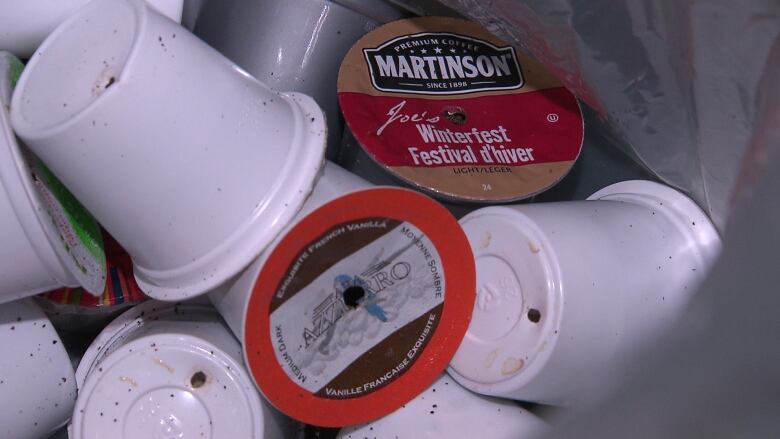Dealing with another plastic problem: Bob McDonald
Most coffee pods not recyclable so they end up in landfills

The City of Hamburg in Germany has bannedsingle-use, plastic coffee pods in government-run buildings.
This, along with Montreal's plan to ban plastic shopping bags by 2018,is another step on the road to getting plastic out of the environment.But is it enough?
Coffee machines that use disposable coffee pods, known as K-Cups, are becoming more popular than drip machines using paper filters.
The problem is thatmost of those cupsare not recyclableso they end up in landfills. More than nine billion of them were sold in 2014 alone. That's a lot of plastic garbage.
So, how did we go from an environmentally benign drip technology that uses recyclable paper and loose coffee grounds that are good for the garden, and easily composted, or percolators and coffee pressesthat are completely reusable, to automatic machines that produce billions of non-recyclable plastic and aluminum containers?
The biggest selling feature of the K-Cups is convenience, of course, because all you need to do is pop the little cup into the machine, push a button and out pours a perfect brew.
Cleanup involves nothing more than tossing the neat little cup into the trash. No messy coffee grounds to wipe off the counter.Out of sight and out of mind.
The manufacturers of Keurig, the original pod machine, say the cups need to withstand the high temperatures and pressures involved in brewing coffee, which is why they are made of tougher, non-recyclable plastic.
Working on the problem
They are working on the problem, but even if the plastic is recyclable, the aluminum lids have to be removed and coffee grounds dumped out. There goes the convenience factor. Vancouver has just allowed the pods to be recycled but only if you first put the foillid in the garbageand empty out the coffee grounds.
It's astoundingthat after decades of "Reduce, Re-use, Recycle" campaigns, and country-wide blue box programs, we still accept disposable, non-recyclableor non-biodegradable products.
The ubiquitouswhiteplastic shopping bag has literally spread around the world, and, as we've heard so many times, a lot of that plastic is ending up in the oceans, where the amount of plastic floating around would equal a stack of two-litre bottles that would stretch to the moon and back twice.
Thankfully, local governments are recognizing the problem with plastic and doing something about it, as Hamburg and Montreal are demonstrating.
Sadly,Toronto tried to introduce a ban on plastic bags, but was shot downseveral years agoby legal challenges from the plastics industry and convenience stores.
This is not to say plastics are all bad. They are the miracle products of the modern age.
Plastic products everywhere
Look around you right now and you will likely see plastic products everywhere, including the clothing you are wearing.
Clever chemistry has resulted in an unbelievable variety of products. But like any product, we have to think beyond its usefulness and convenience.
We have to think about where it goes when it is no longer useful. That means the industry must use more clever chemistry to make the products in a way thatthey won't end up lasting for hundreds or even thousands of years, buried in dumps.
The amount of garbage our cities produce is astounding, as Beirut discovered recently when its landfill site was closed down with no replacement for months, producing an actual river of garbage. The pictures are startling.
In Canada, we do a pretty good job of hiding our trash underground, but we could do a better job of reducing the amount that goes in there in the first place. It's time for industry and governments to step up.












_(720p).jpg)


 OFFICIAL HD MUSIC VIDEO.jpg)
.jpg)



























































































